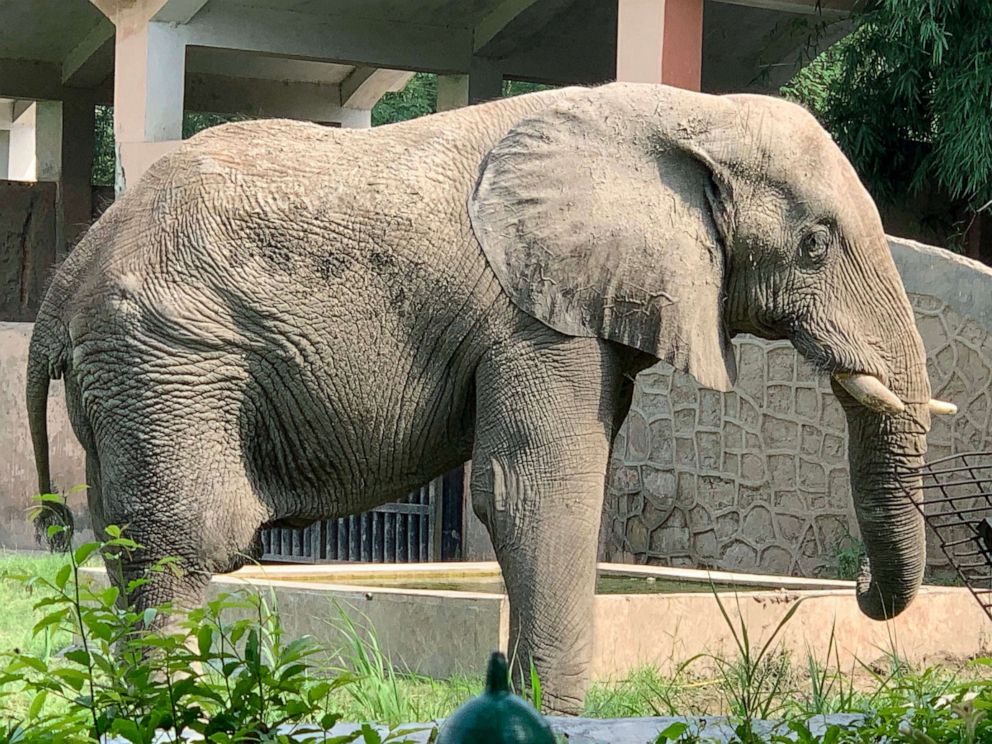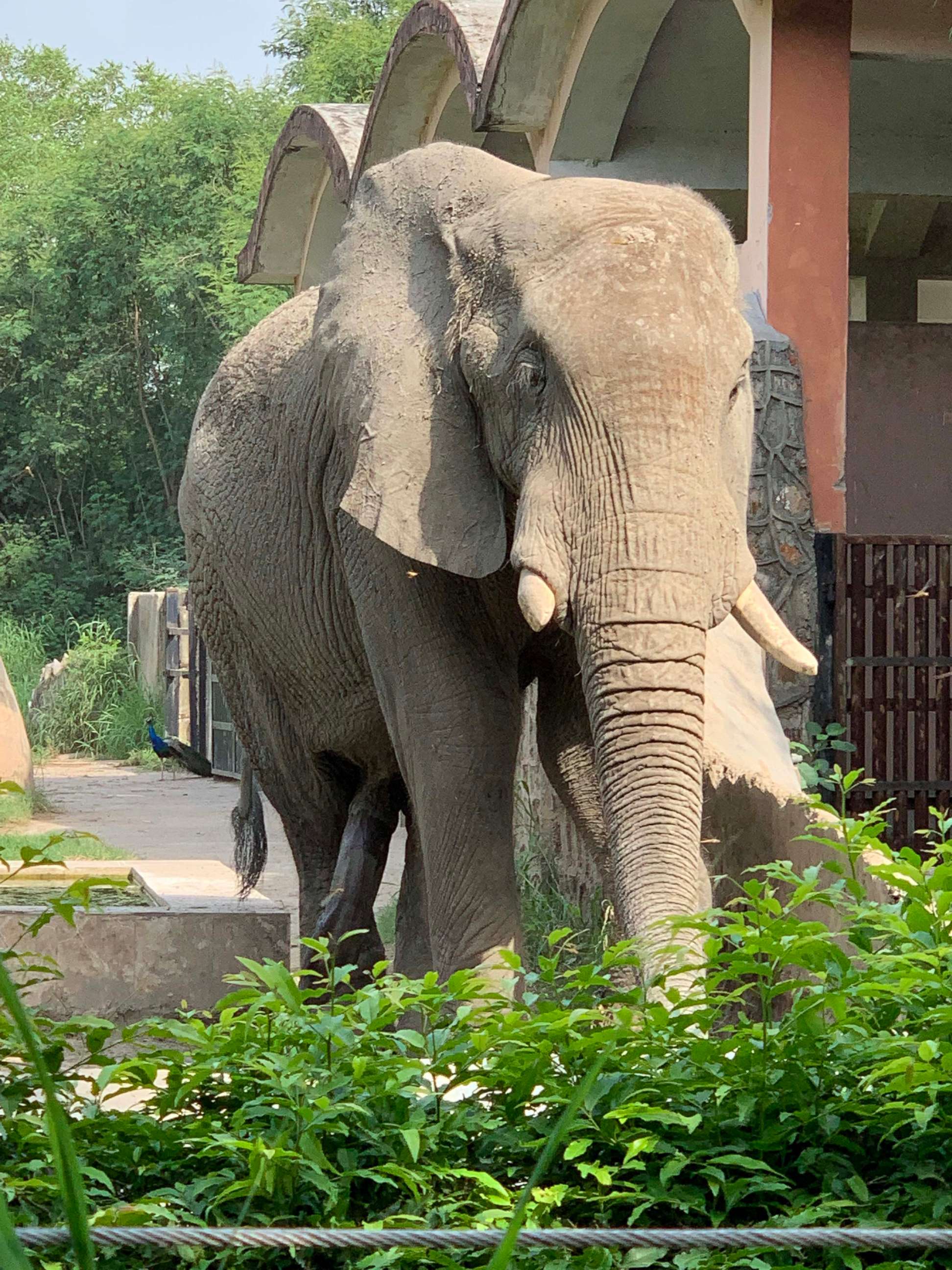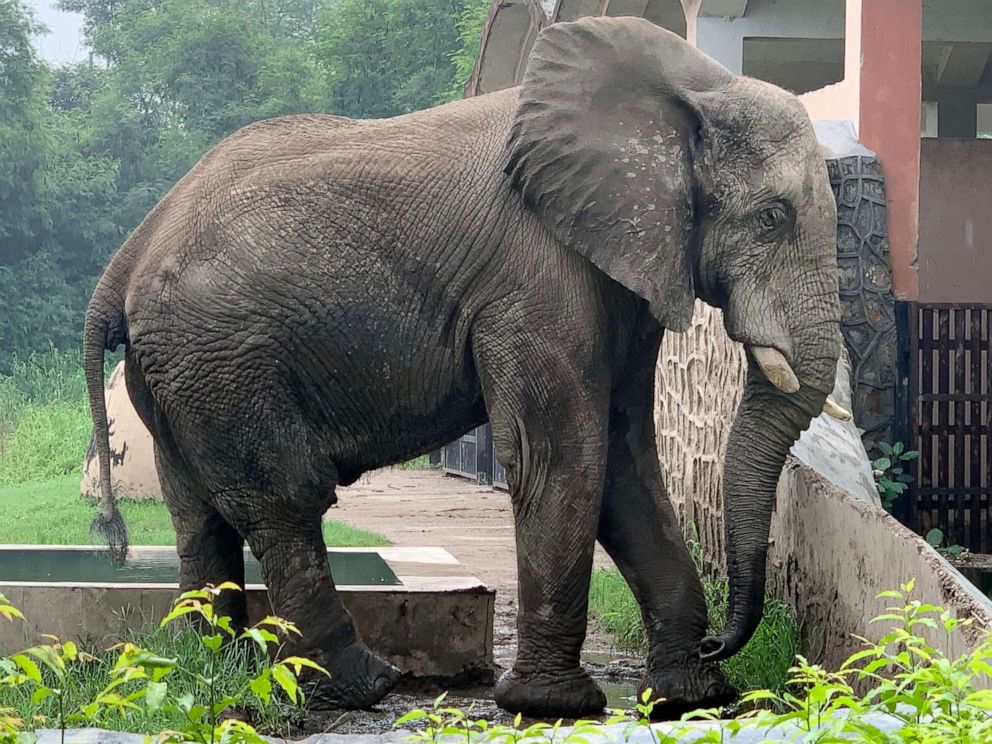A teenager's plea to send Shankar the elephant back home to Africa after 24 years
Shankar was captured from the African wilderness and brought to India in 1998.
LONDON -- When Nikita Dhawan first saw Shankar at the zoo in India's capital last August, she said her "heart broke."
The 26-year-old African elephant had chains around his legs and was living alone in a dismal enclosure. Shankar is one of two African elephants in Indian zoos and the only one at the National Zoological Park in New Delhi, according to Dhawan.
"He had no auditory or visual communication with other elephants, he lacked intellectual stimulation or physical enrichment, there was a railway line like right next to him, there were children screaming and he was chained for 17 hours a day, which was shocking," Dhawan, a 16-year-old student at the American Embassy School of New Delhi, told ABC News during a recent interview.
"All this distress actually caused him to have stereotypic behavior, which is a repetitive type of behavior like head-bobbing or swaying the body," she added. "And it was ironic because the kids around me, they thought that he was dancing out of happiness when it was the exact opposite."
Dhawan, who is the co-founder of a youth-run animal welfare advocacy group called Youth for Animals, decided to launch a campaign last October seeking to send Shankar back home to Africa and spread awareness of the plight of captive elephants. Dhawan and her Youth for Animals co-founder, Nandika Karunakaram, started an online petition via Change.org that has since garnered over 130,000 signatures. They also sent letters to the zoo and various Indian officials, pleading for Shankar's release.

After receiving no response, Dhawan filed a petition in the High Court of Delhi that was heard by a judge on Jan. 3. The judge directed the respondents to consider Dhawan's arguments and scheduled the next hearing for March 9, according to court documents obtained by ABC News. The respondents listed on the petition include the National Zoological Park, India's Central Zoo Authority (CZA), the Indian Ministry of Environment, Forest and Climate Change and the Animal Welfare Board of India, none of whom replied to ABC News' requests for comment or an interview.
Dhawan told ABC News that she has yet to personally hear from the zoo or the other respondents.
In 1998, two young elephants were captured from the wilderness in southern Africa and sent to India as a diplomatic gift from Zimbabwe. The pair, named Shankar and Bombai, were placed in the 176-acre National Zoological Park, formerly known as the Delhi Zoo. Bombai died in 2005 and Shankar has lived alone in captivity there ever since, according to Dhawan, who cited information obtained from the zoo through India's Right to Information Act as well as private conversations with some of the zoo's workers.
Dhawan said she's learned from those conversations that Shankar is kept chained for most of the day, and that the information from the zoo states he's confined to 4,930 square meters. A pathway that once allowed visitors to view Shankar more closely has been permanently cordoned off due to his aggression, which Dhawan said is another key sign of psychological distress.
"I do think that there have been efforts for him to bond with the Asian elephants," she told ABC News, "but the people at the zoo said that he showed a lot of aggressive behavior, so they decided to just keep him solitary."

Dhawan argues in her petition that Shankar should be transferred to an appropriate wildlife sanctuary in Africa or elsewhere that has more ample populations of African elephants. If that's not possible, she says, Shankar should be moved to an elephant sanctuary in India.
"The main thing for Shankar is that we want a sanctuary where there are other African elephants," Dhawan told ABC News, noting that "a domestic option would be a really good temporary solution for Shankar" but "doesn't solve the problem of his solitary confinement."
"There's a misconception that male African elephants don't form social bonds," she added. "But that's not true, they're social beings just like us and Shankar deserves to be with other African elephants. So that's really the rationale for sending him abroad rather than a domestic sanctuary."
Elephants are the largest living land animals on Earth. In the wild, they live in tight-knit herds, forming lifelong bonds with each other, and can walk up to 25 kilometers -- about 15.5 miles -- in a day on average.
In 1930, as many as 10 million wild elephants were estimated to have roamed Africa. Today, that number has dwindled to about 415,000 after decades of poaching, habitat loss and human-elephant conflict, according to the International Union for Conservation of Nature (IUCN), a global conservation group uniting governments and civil society.
Last year, the African forest elephant was assessed as "critically endangered" on the IUCN's Red List of Threatened Species while the African savanna elephant was deemed "endangered." African elephants, which are slightly larger than their Asian cousins, were previously treated as a single species, listed as "vulnerable."

In 2009, India's CZA, the government agency that oversees Indian zoos, banned elephants from zoo collections throughout the country and ordered all zoos to transfer the mega-herbivores to rehabilitation camps.
"There are very few zoos in the country, which have adequate space to permit free movement of elephants, as a result of which they are kept chained for long hours, causing stress to the animal," the CZA stated in the 2009 order, a copy of which was included in Dhawan's petition.
Still, many elephants remain in zoos across India, including two Asian elephants at the zoo housing Shankar and another African elephant named Rambo at the Mysore Zoo in southwestern India. While Youth for Animals is currently focused on freeing Shankar, Dhawan said they aim to have India's other captive elephants moved to sanctuaries as well.
"The main goal of this campaign is not just about Shankar or one elephant; it's trying to open doors for all captive elephants," she added. "We really want to inspire other people to also speak up."
The Aspinall Foundation, a U.K.-registered animal conservation charity, has agreed to fund and implement the translocation and rewilding process of Shankar back to Africa, should Dhawan and Youth for Animals be granted permission to do so.
Dhawan, who was born in the United States but moved with her family to India at a young age, said she became passionate about elephants after volunteering at World Animal Protection in India during the summer of 2020. That's when she learned about the mistreatment of captive elephants in her home country.
"I found it ironic because in India, I feel like we're always praising elephants as these sort of symbols," she told ABC News, "but our words do not reflect our actions."




